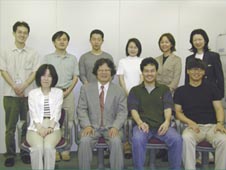  |
 |
 |
|
Encounter
of Language and the Brain in My Life
|
| |
| Dr.
Michio Sugeno |
Head,
Laboratory for Language-Based
Intelligent Systems |
|
|
 |
I
have recently been trying to illuminate the paradigm of everyday language computing.
My Lab, which belongs to the Brain-Style Intelligence Research Group, is doing
research on this subject. The Lab is currently made up of 15 full-time and part-time
researchers, eight of whom specialize in linguistics. I first took a strong interest
in language in the latter part of the 1970's when nearly a decade had passed since
I started my study of fuzzy theory. The word "fuzzy" refers to uncertainty or
unclearness as represented by the ambiguity that our verbal expressions entail.
In the U.S., the concept of an "intelligent system" appeared around the mid 1980's.
To me, however, it meant not just a logical intelligence but rather a fuzzy "one"
as seen in our ordinary and ambiguous use of words. I could refer to it as "clinical
intelligence" (Yujiro Nakamura(1)). I got involved in "fuzzy" theory, as I was
more attracted to Pascal's "depth of subjectivity" than to the objectivism of
Descartes, Marx, etc. I then got attached to Wittgenstein(2) through the "Intelligence
of language." As a result of a linguistic turn in philosophy (R. Rorty(3)), the
20th century has been hailed as the "century of language." This is specifically
indebted to Wittgenstein. It is now assumed the 21st century will become the "century
of the brain." Following the "century of language," however, it might rather turn
out to be the "century of linguistic intelligence." In those days, I had no idea
about linguistics, but I gradually developed a firm belief that there must be
a theory of linguistics much closer to Wittgenstein's point of view than to Chomsky's(4).
I then came across Halliday's linguistic theory in the late 1980's. Halliday originated
systemic functional linguistics. He belonged to the London School in the wake
of Malinowski who advocated the context of situations. I attach importance to
language as something almost synonymous with intelligence because I am curious
about how a human brain processes intelligent information. Human beings use language
to understand and fuse the information they obtain from the outside world, through
their senses of sight, hearing, taste , etc. More importantly, however, we could
say that the articulation of the world through language is exactly what distinguishes
the intellectual recognition of humanity. In 1997, the Ministry of International
Trade and Industry conducted a survey of new computer architectures, and I was
appointed as general manager of a working group evaluating new technologies in
the field of intelligent information processing. The working group consisted of
members from the fields of AI, fuzzy theory, neuro and functional linguistics,
including Professors Minoru Tsukada and Kazuyuki Aihara from the area of neuro.
In March last year, the working group organized a proposal entitled, "The Development
of Everyday Language Computing Technology." The purpose of this proposal was to
assign language comprehension to computers and thereby "verbalize" all the information
processing across computer networks. A language is to a brain what software is
to hardware. A language is born in the brain and mostly develops outside it. It
is said, on the other hand, that a language thus developed will backwash the development
of the brain. Thus, we could infer that there is an inherent or homomorphic correlation
between the structure of a language system as previously explained in linguistics
(but not Chomsky's grammar) and the structure of a speech area in the human brain.
I'm determined to implement a "recombination" from logical intelligence to pursue
the "intelligence of language." By so doing do, I wish to discern what a brain-style
intelligent architecture should be.
 |
| Myself,
second person from bottom left. |
(1) A typical philosopher in modern Japan who introduced
French structuralism to Japan.
(2) One of the greatest philosophers in the 20th century. Regarded as comparable
to Heidegger. He discerned that philosophical issues are none other than linguistic
issues.
(3) A typical philosopher in modern American philosophy. He generalized 20th century
philosophy by describing the Wittgenstein school of linguistic philosophy as a
"linguistic turn."
(4) A Cartesian linguist who claimed that an infant could learn a language readily
due to the "universal grammar" inherent in human brains.
|
  |
|
|






